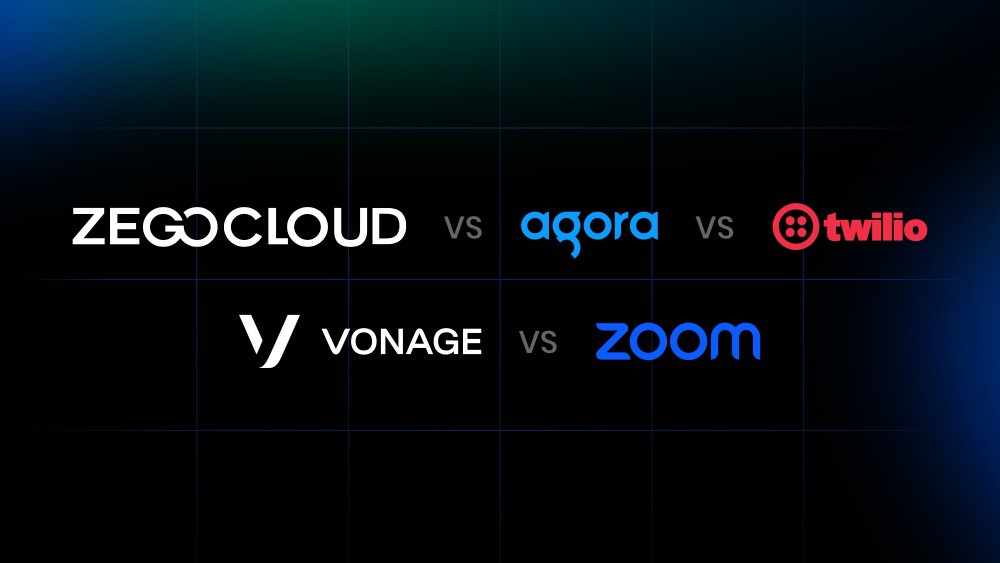With the availability of technology, the communication barriers due to geographical distances have been significantly reduced. After all, people can now communicate with their loved ones using video and voice calls. With this, the demand for a good video and audio chat app is also rising. Thus, if you’re looking to build such an application for yourself, this article discusses ZEGOCLOUD vs Agora vs Twilio vs Vonage vs Zoom.
Agora vs Twilio – Which One is Right for You?
When comparing Agora and Twilio for your real-time communication needs, it’s essential to consider each platform’s unique aspects and capabilities. Agora shines with its focus on real-time audio and video engagement, perfect for applications requiring low latency, such as live streaming and interactive gaming. On the other hand, Twilio has historically offered a broad spectrum of communication solutions, including SMS, voice, and email services, catering to projects that demand a multifaceted communication approach.
However, it’s important to note a significant change in the landscape: Twilio’s video services have been discontinued. This shift necessitates a reevaluation of Twilio for projects that need video communication capabilities and highlights the importance of looking into alternatives to fill this gap effectively.
In this context, exploring other real-time communication platforms becomes crucial. ZEGOCLOUD emerges as a noteworthy alternative, offering a user-friendly and cost-effective real-time audio and video communication solution. Its emphasis on performance and affordability makes it an attractive option for developers.
Key Limitations of Agora You Should Know
While Agora is a strong contender in the real-time communication space, it does have some areas where it falls short. Here are four notable limitations:
- Limited Customization: Agora may not offer the same level of flexibility and customization options as some other platforms, which can be a drawback for developers seeking highly tailored solutions.
- Pricing Complexity: Agora’s pricing model can be complex and difficult to predict, especially for businesses with fluctuating usage, making cost management challenging.
- Support Response Times: Users have reported slower response times from customer support, which can be frustrating when dealing with time-sensitive issues.
- Documentation Gaps: While Agora provides comprehensive documentation, some users find that it lacks depth in certain areas, making it harder to resolve specific technical challenges.
👉 Switch from Agora to ZEGOCLOUD
ZEGOCLOUD: Voice & Video Chat API for Real-Time Interaction
While establishing meaningful connections globally, ZEGOCLOUD API is a perfect Agora alternative to enhance your existing applications’ capabilities and make them more interactive. Apparently, this API is a popular alternative to Agora vs Twilio vs Vonage and many other APIs for building video and voice chat apps. ZEGOCLOUD generally has developer-friendly UIKits with more than 50 customizable UI components. Furthermore, you can integrate this API/SDK with up to 18 programming languages and frameworks.
Meanwhile, ZEGOCLOUD’s video call API and voice chat API have modern features like one-on-one calls, group calls, conferences, quality monitoring, live streaming, virtual background, face beautification, etc. Moreover, the features also include screen sharing, audio effects, and call recording to make your communication more interactive.
Key Features
- AI Noise Reduction: The availability of AI noise reduction technology allows for eliminating background noises. Moreover, this makes your call more engaging because you will only hear human noises.
- Ultra-Low Latency: ZEGOCLOUD delivers an ultra-low latency of 300ms for both audio and video support. Hence, you will experience crispy and clear communication without disruptions.
- Co-hosting: The members or participants in a particular video conference can also co-host an event or occasion. With co-hosting, user interaction is also enhanced.
- Super-resolution: For a better and more immersive user experience, the super-resolution support from ZEGOCLOUD enhances live videos from low to higher resolutions.
- Cross-platform Support: You can access ZEGOCLOUD on major OS platforms, as it supports more than 15000 devices for end-user ease.
Advantages
- With ZEGOCLOUD, you can enhance virtual collaboration significantly through the use of interactive whiteboards. These whiteboards come equipped with various sets of markup tools, enabling teams to work together seamlessly, no matter where they are located.
- Additionally, ZEGOCLOUD provides a comprehensive analytics dashboard that allows for monitoring log history and call quality metrics. This feature is invaluable for identifying and resolving persistent issues during calls, ensuring high-quality communication experiences.
- These tools make ZEGOCLOUD an excellent choice for businesses looking to improve their remote collaboration capabilities and maintain high standards of communication efficiency.
Disadvantage
- It currently only supports English, which might be limiting for non-English users.
Agora: Real-Time Voice and Video Engagement for Apps
Develop real-time communication simply and conveniently Agora vs Twilio – which one is right for you? using Agora video and audio chat API. You may have heard of the Agora vs Twilio comparison, and Agora is surely a top solution. After all, this API/SDK can drive virtual engagement in a meaningful way through its outstanding communication support. After all, the APIs are fully customizable as per your business needs.
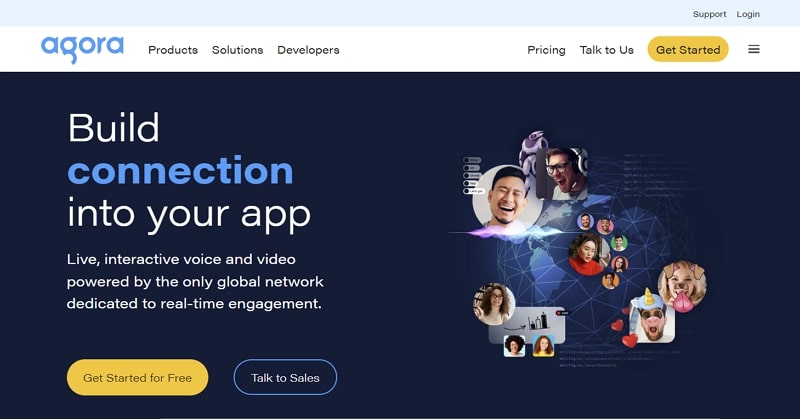
Moreover, you can track audio and video streams within your video calls, use screen sharing, record calls, and add multiple extensions to enhance your user experience. Meanwhile, you’ll have a 48 kHz sampling rate with dedicated sound capacity.
Key Features
- Live Streaming: You will have fully interactive live streaming with ultra-low latency support. Hence, there will not be any disruption or unnecessary interruption.
- Screen Recording: There is an option to record your screen during live streaming or any video call session. In fact, you can also share your screen.
- 3D Spatial Audio: The availability of 3D spatial audio enhances your overall listening experience with better sound and audio range.
Advantages
- With the metrics dashboard, you can track real-time troubleshooting in your call quality. This allows you to track, locate, and solve potential issues.
- You can send instant messages during the calls, including GPS locations, media files, thumbnails, push notifications, and structured messages.
Disadvantage
- There is an inability to link the same users within the platform and with limited search functions.
Twilio: Communication APIs for SMS, Voice, and Video
Efficiently connect with people around the world using Twilio communication API. There’s a strong debate going around the Twilio vs. Vonage API rivalry. Concurrently, Twilio API has important functionalities by which you can communicate via chat, audio, and video calls. Moreover, the platform uses WebRTC protocol to establish high-quality and interruption-free calling interactions.
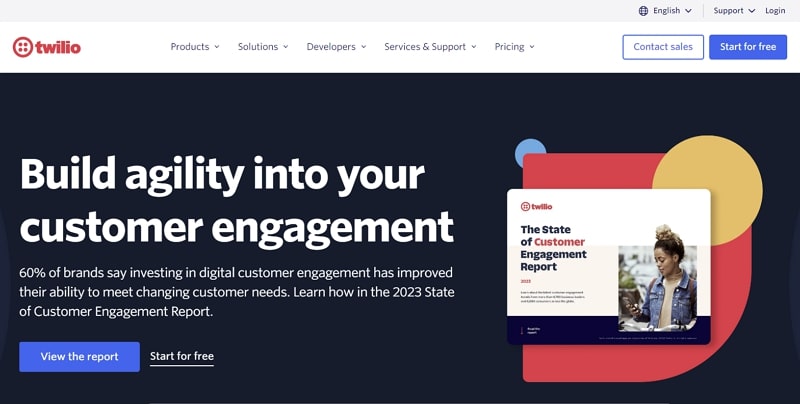
In contrast, Twilio API utilizes popular Cloud infrastructure while supporting major platforms like Android, JS, and iOS. Above all, the platform uses REST APIs that allow modifying calls or making outgoing calls. If you are interested in Twilio API pricing details, please look at the Twilio API Pricing Review article for more.
Key Features
- Virtual Backgrounds: The availability of virtual backgrounds allows changing your backgrounds during the calls. So, you don’t need to worry if your background is problematic.
- Custom Layouts: With the custom layout function, you can design and define arrangements of your video call through grid layouts, overlaying, screen resizing, etc.
- Noise Cancellation: Twilio comes with noise cancellation support by which you can filter annoying background noises in your audio and video calls.
Advantages
- There is proper developer support with the availability of documentation, tools, and other reference apps. Secondly, this makes the integration process easier for developers.
- Support for multiple programming languages and frameworks exists, including .Net, Java, Node.js, PHP, Python, Ruby, iOS, Android, and JavaScript.
Disadvantage
- The interface is not user-friendly, which means a new user will find it difficult to start the API integration process.
Tips: Move from Twilio to ZegoCloud Migration Guide
In the wake of Twilio Video SDK services coming to an end, we understand the challenges businesses face in finding a reliable and scalable video solution. That’s where ZEGOCLOUD Video SDK steps in – a cutting-edge, feature-rich alternative designed for a smooth Twilio to ZEGOCLOUD video migration and enhanced user experience.
Make the switch to ZEGOCLOUD Video SDK today and experience a world of seamless, high-quality video communication solutions tailored to your business needs. Let us help you navigate this transition effortlessly and elevate your user experience to new heights.
Sign up for ZEGOCLOUD to get 10000 free minutes>>
Vonage: Communication APIs
Vonage API is a trusted solution to build effective connections across borders in a simplified way. After all, this communication API has solutions within audio, video, and message chat support. Thus, developers can easily integrate this API into their existing applications and make them more extensive. Meanwhile, the Twilio vs Vonage API comparison gets discussed a lot, and surprisingly, Vonage provides more use cases.
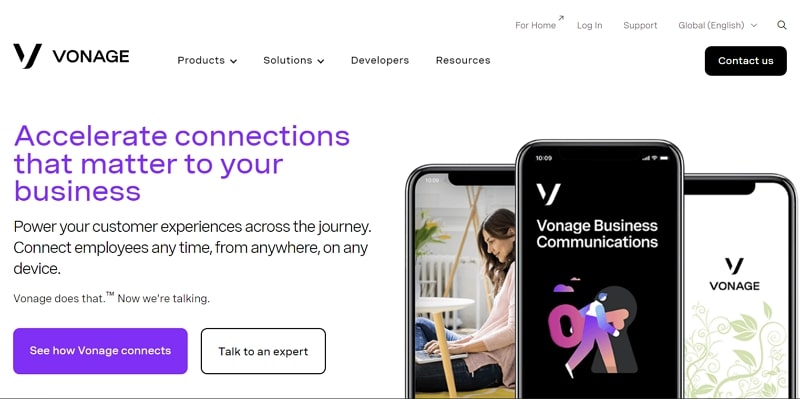
Moreover, Vonage provides top-quality audio and video calls with low-latency network support. The platform delivers WebRTC and PSTN calling with a reliable, interruption-free connection.
Key Features
- Multiple Languages: The connected API provides multi-language support that allows you to stage PSTN and IP calling experiences on a global network.
- Text-to-Speech: Turn your written texts into sounding speech in different languages and voices. By this, you can instantly call large audiences without third-party support.
- Encrypted Recordings: You can effortlessly do video recordings, as there’s the presence of AES-256 encryption. This is essential to maintain deep security over a network.
Advantages
- The audio playback facility allows for a rich calling experience with extensive functions. Thus, you could hold music or establish personalized voice prompts.
- With two-factor authentication, you can add a security layer to your communication network. After all, it’s essential to proceed with sensitive tasks with care.
Disadvantage
- Customer support service is not good because the support personnel are mostly unavailable.
Zoom: One Platform for Video Conferencing
Making communication easier and simpler, Zoom is a versatile platform to allow you to establish useful interactions worldwide. With Zoom SDK, developers can accelerate their development process as they don’t need to build video chat apps from scratch. Integrate the provided SDKs with relevant UIKits, and your application will be ready. Of course, you can customize the SDK as needed.
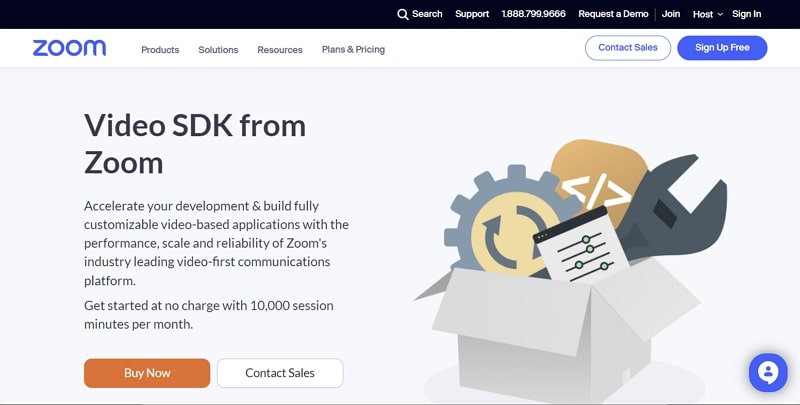
Moreover, the provided video quality possesses optimization for HD resolutions, while audio support is exceptional. Although Zoom is a paid communication software, it still offers free services of 10,000 minutes every month.
Key Features
- Cloud Infrastructure: Zoom’s system has been developed on Cloud infrastructure. Hence, you can access your profile or stage personal calls from anywhere in the world.
- Screen Sharing: There is a possibility to share a screen by which users can enhance productivity, especially during live conferences or meetings.
- Chat Facility: Users can chat in groups or personal chats during calls. Providing emojis, expressions, or stickers to replies is also an option.
Advantages
- Zoom allows users to process live streaming from third-party solutions. Therefore, you don’t need to search for separate platforms if you need live streaming use.
- Users can share multimedia items like videos, images, and documents within the chats. This is necessary for collaboration on collective tasks.
Disadvantage
- Zoom consumes a great amount of bandwidth during video calls. Hence, users with limited internet access face connectivity problems.
You may also like: How to Build A Video Conferencing Zoom Clone App
Features Comparison: ZEGOCLOUD vs Agora vs Twilio vs Vonage vs Zoom
Different video and voice chat APIs are currently available. Meanwhile, all of them possess either similar or distinct features. To know more about these APIs and their respective features, check the tables given below:
1. Video Call
Video call is an important utility that allows people to establish face-to-face communications, irrespective of geographical location. Meanwhile, the video call functionality is embedded in most APIs. Let’s find how the video call functionality exists in these APIs:
| Feature | ZEGOCLOUD | Agora | Twilio | Vonage | Zoom |
|---|---|---|---|---|---|
| 1-on-1 Call | Yes | Yes | No | Yes | Yes |
| Group Call | Yes | Yes | No | Yes | Yes |
| Virtual Background | Yes | Yes | Yes | Yes | Yes |
| Call Recording | Yes | Yes | Yes | Yes | Yes |
| Screen Sharing | Yes | Yes | Yes | Yes | Yes |
| Notifications | Yes | Yes | Yes | Yes | No |
| Spatial Audio | Yes | Yes | No | Yes | No |
| Noise Reduction | Yes | Yes | Yes | Yes | Yes |
| Analytics Support | Yes | Yes | Yes | Yes | Yes |
| Remote Mute | Yes | Yes | Yes | Yes | Yes |
| Developer Tools | Yes | Yes | Yes | Yes | Yes |
| Whiteboard | Yes | Yes | Yes | Yes | Yes |
| Call Monitoring | Yes | Yes | Yes | Yes | No |
| Call Invitation | Yes | Yes | Yes | Yes | Yes |
| Text Chat | Yes | Yes | Yes | Yes | Yes |
| Active Speaker Detection | Yes | Yes | Yes | Yes | Yes |
| Emoji | Yes | Yes | Yes | Yes | No |
2. Live Streaming
Live streaming is an interactive way of communicating with audiences through broadcasting live content. Many applications support live streaming. If you need to build your own app, find the best live streaming APIs here alongside tabular comparisons:
| Feature | ZEGOCLOUD | Agora | Twilio | Vonage | Zoom |
|---|---|---|---|---|---|
| Virtual Avatar | Yes | No | No | No | Yes |
| Recording | Yes | Yes | Yes | Yes | Yes |
| Live Stream Forwarding | Yes | Yes | Yes | Yes | Yes |
| Quality Monitoring | Yes | Yes | Yes | Yes | No |
| Screen Sharing | Yes | Yes | Yes | Yes | Yes |
| Real-time Messaging | Yes | Yes | Yes | Yes | Yes |
| Live Interactions | Yes | Yes | Yes | Yes | Yes |
| Invitations | Yes | Yes | Yes | Yes | Yes |
| Notifications | Yes | Yes | Yes | Yes | Yes |
Pricing: ZEGOCLOUD vs Agora vs Twilio vs Vonage vs Zoom
As all these video calling APIs are thoroughly discussed in this article, let’s proceed by checking their respective prices as video chats and live streaming modules:
1. Video Call Pricing
Known as an ideal sort of real-time facial communication, video chats are a great facility to interact across the world while sitting anywhere in the world. To understand how some of the different yet reliable video chat API costs, let’s find here:
| ZEGOCLOUD | Agora | Twilio | Vonage | Zoom |
|---|---|---|---|---|
| Video HD: $3.99/1,000 participant minutes | Video HD: $3.99/1,000 minutes | Video P2P: $0.0015 per participant per minute | 0.00395 per participant / per minute | Pro: $149.90/year/user |
| Video Full HD: $8.99/1,000 participant minutes | Video Full HD: $8.99/1,000 minutes | Video Groups: $0.004 per participant per minute | Business: $199.90/year user | |
| Video 2K: $15.99/1,000 participant minutes | ||||
| Video 4K: $35.99/1,000 participant minutes |
2. Live Streaming Pricing
By using live streaming, businesses can broadcast their services to a greater audience through video and voice mediums in an efficient way. Subsequently, there are endless applications that provide live video streaming. Many reliable APIs have already been discussed. If you wish to build your own app, let’s proceed to find their pricing:
| ZEGOCLOUD | Agora | Twilio | Vonage | Zoom |
|---|---|---|---|---|
| Audio: $0.59/1,000 minutes | Audio Only: $0.99/1,000 minutes | Not Provided | $0.00395 per participant / per minute | Zoom Sessions: $990.00/year/license |
| Video HD: $2.29/1,000 minutes | Video HD: $3.99/1,000 minutes | Zoom Events: $1,490.00/year/license | ||
| Video Full HD: $8.99/1,000 minutes | Video Full HD: $8.99/1,000 minutes |
Support Comparison: ZEGOCLOUD vs Agora vs Twilio vs Vonage vs Zoom
This article discussed five important video and voice chat APIs that also provide live-streaming functionalities. For more understanding of their environments, let’s find the backend support they rely on within video chats and live streaming services:
1. Video Call Support
Video call APIs are a great assistance to build your video chat apps without coding from scratch. Let’s discover the backend support behind some major APIs in this table:
| ZEGOCLOUD | Agora | Twilio | Vonage | Zoom |
|---|---|---|---|---|
| iOS, Android, Web, Flutter, React Native, Flutter, Electron, Unity3D, Cocos Creator, Windows, macOS | Android, iOS, Web, macOS, C++, Windows, Unity, Flutter, React Native, Flutter, Linux C++, Linux C, Linux Java, Cocos Creator | Web, Android, iOS | Web, Android, iOS, Linux, Mac, Windows, React Native, Server SDKs / Rest API | Web, iOS, Android, macOS, Windows, React Native, Linux, Flutter |
2. Live Streaming Support
By using live streaming APIs, you can make interesting apps with special broadcasting functionalities. Here you will find framework support behind different popular APIs:
| ZEGOCLOUD | Agora | Twilio | Vonage | Zoom |
|---|---|---|---|---|
| iOS, Android, Web, Flutter, React Native, Flutter, Electron, Unity3D, Windows, macOS | Android, iOS, Web, macOS, C++, Windows, Unity, Flutter, React Native, Flutter, Linux C++, Linux C, Linux Java, Cocos Creator, RESTful APIs | Web, Android, iOS | Web, Android, iOS, Linux, Mac, Windows, React Native, Server SDKs / Rest API | Web, iOS, Android, macOS, Windows, React Native, Linux, Flutter |
Conclusion
Overall, video and voice chat APIs, together with live streaming support, are a great assistance for your application. After all, you can make your apps more interesting and special with these functions. Meanwhile, in this article, we discussed 5 different API/SDKs, including their prices, including Twilio pricing. The best and most recommended API is ZEGOCLOUD.
Read more:
ZEGOCLOUD vs Agora vs Twilio vs Vonage vs Zoom FAQ
Q1: What sets ZEGOCLOUD, Agora, Twilio, Vonage, and Zoom apart?
ZEGOCLOUD and Agora focus on real-time communication, Twilio and Vonage offer broader communication APIs, and Zoom is primarily a video conferencing platform.
Q2: How do ZEGOCLOUD, Agora, Twilio, Vonage, and Zoom compare in pricing?
ZEGOCLOUD and Agora have usage-based pricing, Twilio and Vonage have more complex API-based pricing, and Zoom uses a subscription model.
Q3: When is ZEGOCLOUD the better choice over Agora, Twilio, Vonage, or Zoom?
ZEGOCLOUD is ideal for real-time communication needs like live streaming, online education, and gaming, offering flexible SDKs for developers.
Let’s Build APP Together
Start building with real-time video, voice & chat SDK for apps today!









